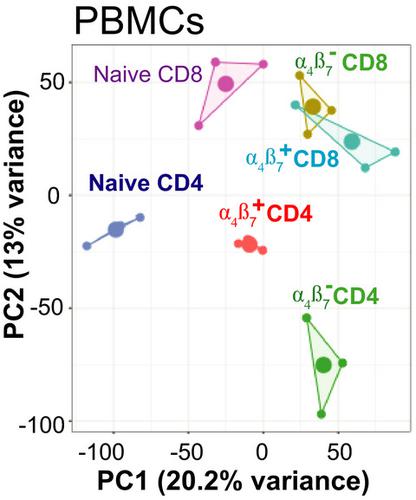当前位置:
X-MOL 学术
›
FEBS Lett.
›
论文详情
Our official English website, www.x-mol.net, welcomes your
feedback! (Note: you will need to create a separate account there.)
Circulating integrin α4β7+ CD4 T cells are enriched for proliferative transcriptional programs in HIV infection
FEBS Letters ( IF 3.0 ) Pub Date : 2021-07-19 , DOI: 10.1002/1873-3468.14163 Yashavanth S Lakshmanappa 1 , Jamin W Roh 1, 2 , Niharika N Rane 1 , Ashok R Dinasarapu 3 , Daphne D Tran 1 , Vijayakumar Velu 4, 5 , Anandi N Sheth 6, 7 , Igho Ofotokun 6, 7 , Rama R Amara 5, 8 , Colleen F Kelley 9 , Elaine Waetjen 10 , Smita S Iyer 1, 11, 12
FEBS Letters ( IF 3.0 ) Pub Date : 2021-07-19 , DOI: 10.1002/1873-3468.14163 Yashavanth S Lakshmanappa 1 , Jamin W Roh 1, 2 , Niharika N Rane 1 , Ashok R Dinasarapu 3 , Daphne D Tran 1 , Vijayakumar Velu 4, 5 , Anandi N Sheth 6, 7 , Igho Ofotokun 6, 7 , Rama R Amara 5, 8 , Colleen F Kelley 9 , Elaine Waetjen 10 , Smita S Iyer 1, 11, 12
Affiliation

|
HIV preferentially infects α4β7+ CD4 T cells, forming latent reservoirs that contribute to HIV persistence during antiretroviral therapy. However, the properties of α4β7+ CD4 T cells in blood and mucosal compartments remain understudied. Employing two distinct models of HIV infection, HIV-infected humans and simian–human immunodeficiency virus (SHIV)-infected rhesus macaques, we show that α4β7+ CD4 T cells in blood are enriched for genes regulating cell cycle progression and cellular metabolism. Unlike their circulating counterparts, rectal α4β7+ CD4 T cells exhibited a core tissue-residency gene expression program. These features were conserved across primate species, indicating that the environment influences memory T-cell transcriptional networks. Our findings provide an important molecular foundation for understanding the role of α4β7 in HIV infection.
中文翻译:

循环整合素 α4β7+ CD4 T 细胞在 HIV 感染中富集增殖转录程序
HIV 优先感染 α 4 β 7 + CD4 T 细胞,形成潜在的病毒库,在抗逆转录病毒治疗期间导致 HIV 持续存在。然而,血液和粘膜区室中α 4 β 7 + CD4 T 细胞的特性仍未得到充分研究。采用两种不同的 HIV 感染模型,HIV 感染的人类和猿猴-人类免疫缺陷病毒 (SHIV) 感染的恒河猴,我们表明血液中的 α 4 β 7 + CD4 T细胞富含调节细胞周期进程和细胞代谢的基因. 与循环对应物不同,直肠 α 4 β 7 +CD4 T 细胞表现出核心组织驻留基因表达程序。这些特征在灵长类物种中是保守的,表明环境影响记忆 T 细胞转录网络。我们的研究结果为理解 α 4 β 7在 HIV 感染中的作用提供了重要的分子基础。
更新日期:2021-09-13
中文翻译:

循环整合素 α4β7+ CD4 T 细胞在 HIV 感染中富集增殖转录程序
HIV 优先感染 α 4 β 7 + CD4 T 细胞,形成潜在的病毒库,在抗逆转录病毒治疗期间导致 HIV 持续存在。然而,血液和粘膜区室中α 4 β 7 + CD4 T 细胞的特性仍未得到充分研究。采用两种不同的 HIV 感染模型,HIV 感染的人类和猿猴-人类免疫缺陷病毒 (SHIV) 感染的恒河猴,我们表明血液中的 α 4 β 7 + CD4 T细胞富含调节细胞周期进程和细胞代谢的基因. 与循环对应物不同,直肠 α 4 β 7 +CD4 T 细胞表现出核心组织驻留基因表达程序。这些特征在灵长类物种中是保守的,表明环境影响记忆 T 细胞转录网络。我们的研究结果为理解 α 4 β 7在 HIV 感染中的作用提供了重要的分子基础。











































 京公网安备 11010802027423号
京公网安备 11010802027423号